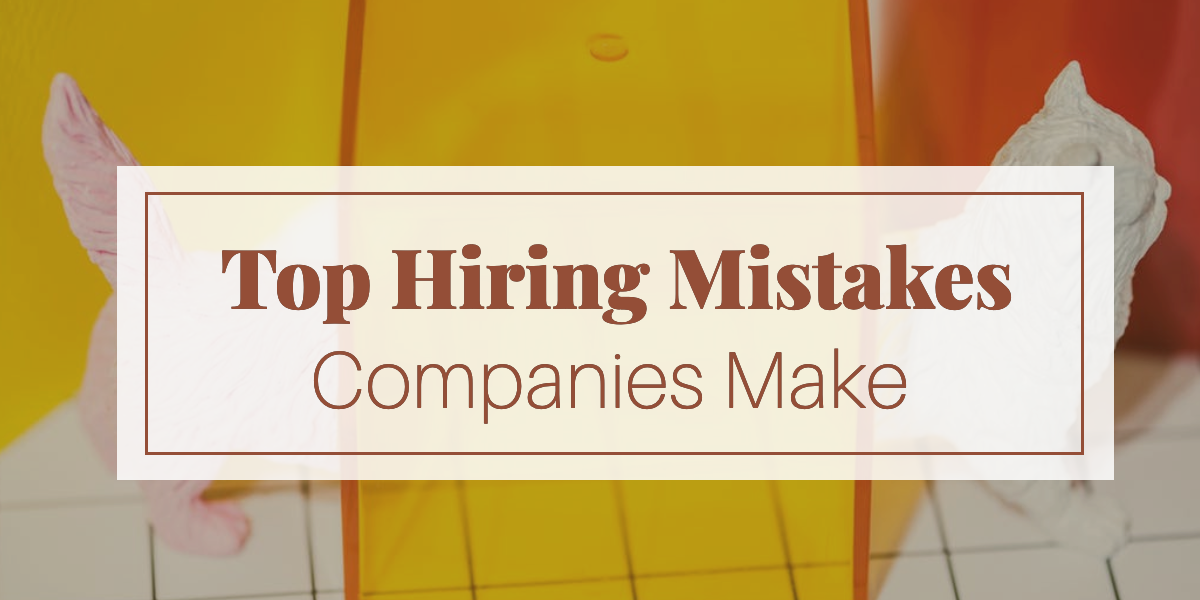.png?width=1200&name=top-hiring-mistakes-companies-make%20(1).png)
Recruiting, hiring, and onboarding new talent is a time-consuming and expensive process. Sourcing qualified applicants, narrowing down the pool, completing interviews and reaching a consensus about a candidate can take several weeks. Then, once you’ve chosen someone, it can take months before a new employee is fully trained and able to handle the duties of their job effectively. In other words, when you’re ready to make a hiring decision, it’s crucial you make the right one.
As an HR leader, much of the hiring process falls on your shoulders. And while it can be stressful, you’re also in a unique position to help eliminate common hiring mistakes, streamline operations, and to ensure your organization is staffed with highly-qualified and capable professionals.
Here are six common hiring mistakes and how to avoid them:
1. Unclear job descriptions
To attract top talent, your job descriptions must be well-written, enticing, and highlight the best perks and advantages your employees enjoy. However, it’s also crucial you’re honest, transparent and straightforward.
Inadvertently deceiving job seekers with inaccurate details can result in a poor applicant experience and can contribute to higher turnover rates.
Before publishing a job posting, take time to chat with not only the hiring manager but also other employees in similar roles who can provide an accurate description of what the position entails. Make sure there are no surprises when it comes to job responsibilities and qualifications.
2. No applicant phone screening process
After you’ve narrowed your applicant stack to the candidates who meet your skill and experience requirements, you may be tempted to begin scheduling on-site interviews immediately. However, setting aside a few minutes for a short phone call with each candidate can help save you plenty of time later.
Screening calls allows you to evaluate an applicants’ professionalism and level of interest in the position, as well as help you learn more about their experience. This also provides you with an opportunity to share additional details about the company, the job role, and the interview process so applicants can determine whether they’re interested in moving on to the next step.
3. No interviewer training
Not everyone knows how to conduct effective and thorough interviews — and even professionals who have experience interviewing job candidates may not be familiar with employment laws and compliance procedures.
Furthermore, when multiple people interview a candidate, there’s a good chance they’ll overlap by asking the same interview questions, which wastes valuable time. Hosting a mandatory interviewer training session for everyone on the hiring committee can help ensure a smoother, more efficient process.
4. Failing to ask the right interview questions
As an experienced HR professional, you likely always enter interviews with a carefully composed set of questions. But are you sure the hiring manager and other decision-makers are equally as prepared?
One of the most common hiring mistakes employers make is not giving candidates enough time to talk about themselves outside their credentials. It’s crucial you use interviews not only as an opportunity for candidates to further highlight their technical skills, but also as a way to gain insight into their personality, temperament, critical thinking abilities, and other soft skills.
Be sure to ask candidates how they would handle specific challenges, how they would behave in certain situations, and what they’ve done to overcome setbacks and failures in the past. These challenging, more subjective questions often help you gather the information you need to make the most comprehensive decision possible.
5. Not evaluating candidates’ culture fit
Technical skills and industry experience are important, but basing your decision solely on these criteria can lead to negative consequences. Just because an applicant sounds like the perfect fit on paper doesn’t mean they’ll thrive in your company’s culture.
“A far better selection criterion is to ensure there’s a ‘DNA’ match between the candidate and your organization,” says Jeff Hyman, chief talent officer at Strong Suit, in an article for Forbes. “DNA is the three or four characteristics that your top performers share and are the bedrock of your culture.”
Take a moment to identify a few commonalities among the top performers in the department you’re hiring for, as well as the non-negotiable values upheld by your organization. Make sure the candidate you choose displays those key characteristics and can commit to upholding the values you deem most important.
6. Making decisions too quickly (or too slowly)
Rushing into any business decision can be risky, and this is especially true when it comes to hiring employees. Even when you’re feeling pressure from stakeholders to fill a position as quickly as possible, it’s vital you adhere to your process and fully evaluate multiple candidates before making your selection.
Of course, you don’t want to drag out the decision, either. Deliberating over candidates too long or letting too much time lapse between communications with applicants could mean missing out on top talent. If a candidate has impressed you, they’re likely impressing other employers, too. Set a deadline for your decision and ensure the hiring committee sticks to it.
Hiring the right employees is essential to reducing turnover, maintaining a positive culture, and meeting critical business goals. By avoiding these six hiring mistakes, you can increase your chances of choosing the best candidate every time.
